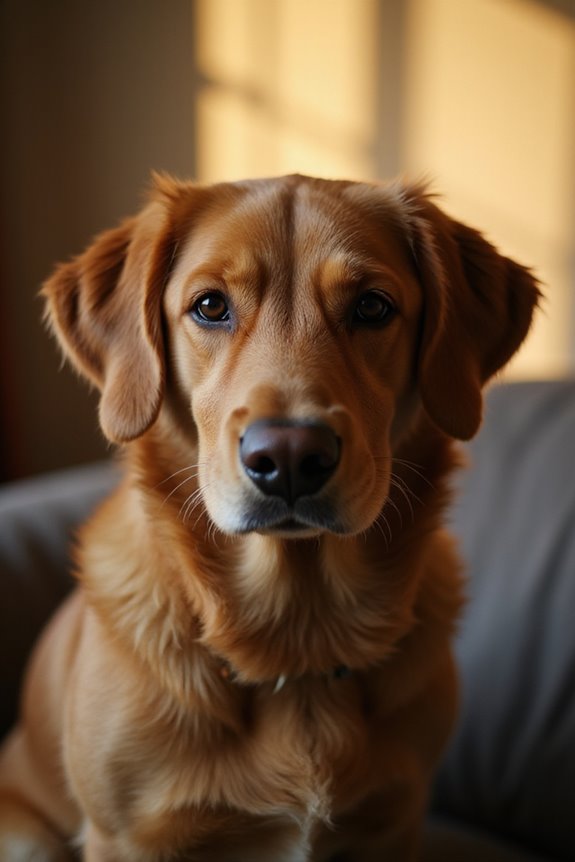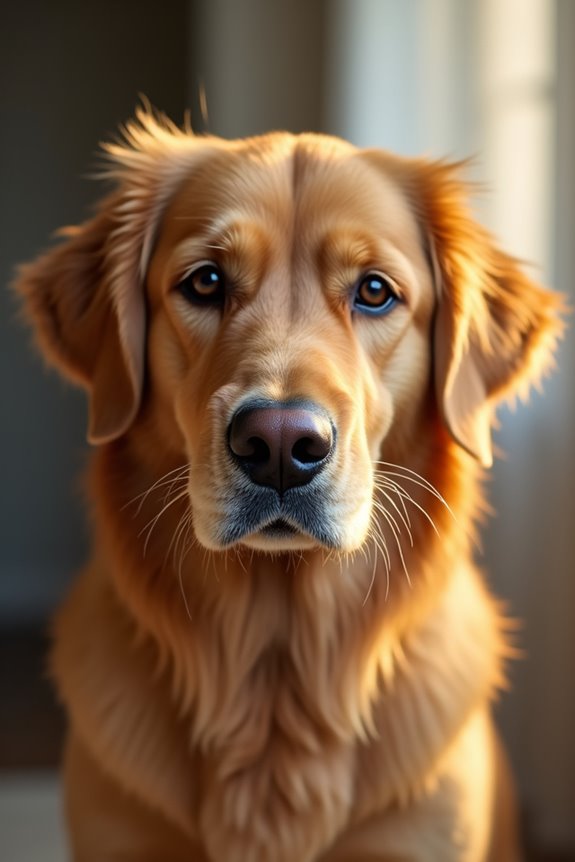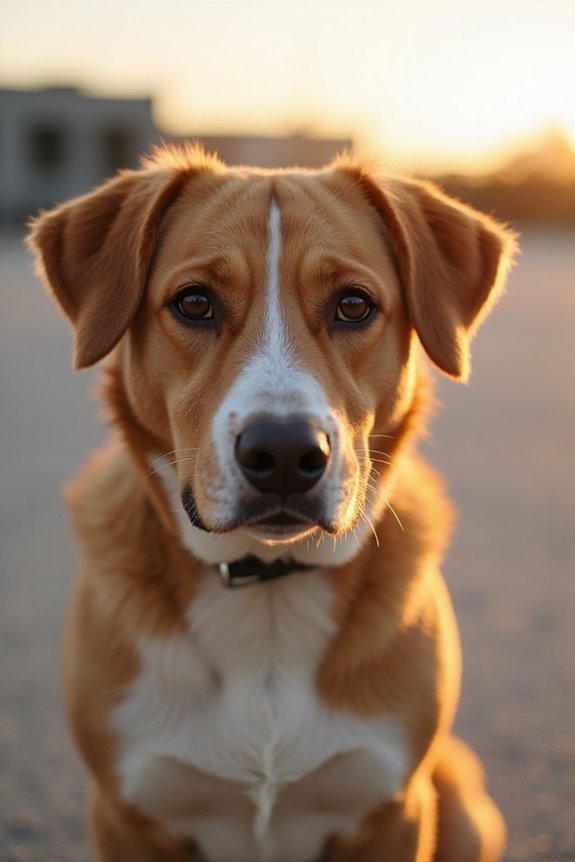To help your dog afraid of fireworks, start with desensitization using low-volume recordings paired with treats. Gradually increase the volume, monitoring your dog’s stress signals. Create a safe, quiet space with comforting items, and consider using white noise machines to mask sounds. Additionally, pharmacological options like alprazolam may provide relief during events. Make certain you have a consistent routine and provide high-value treats during exposure to form positive associations. There are effective strategies that can help minimize their anxiety.
Key Takeaways
- Create a safe, quiet space for your dog with comforts like a bed, toys, and water to minimize noise exposure during fireworks.
- Employ desensitization training by gradually exposing your dog to low-volume firework sounds, rewarding calm behavior with treats.
- Use counter-conditioning techniques, pairing noise exposure with high-value treats to create positive associations with the sound of fireworks.
- Consider calming products like anxiety wraps, pheromone diffusers, or natural supplements to help soothe your dog’s anxiety.
- Consult your veterinarian for potential pharmacological treatments if your dog’s fear is severe or unmanageable.
Understanding Firework Fear in Dogs
Understanding that fireworks can induce fear in dogs is essential for pet owners. Approximately 50-52% of dogs show some level of fear toward these loud noises, which can greatly impact their welfare. This fear is particularly pronounced in older dogs, whose sensory decline affects their ability to locate sounds, increasing anxiety. The unpredictable nature of fireworks, combined with a dog’s genetic predisposition to anxiety, can lead to intensified reactions. Fear responses can manifest as hiding, shaking, or pacing. It’s important to recognize that not all dogs will react the same, as individual temperament and experience influence their fear levels. By being aware of these factors, we can better support our pets during these stressful events.
Effective Behavioral Interventions
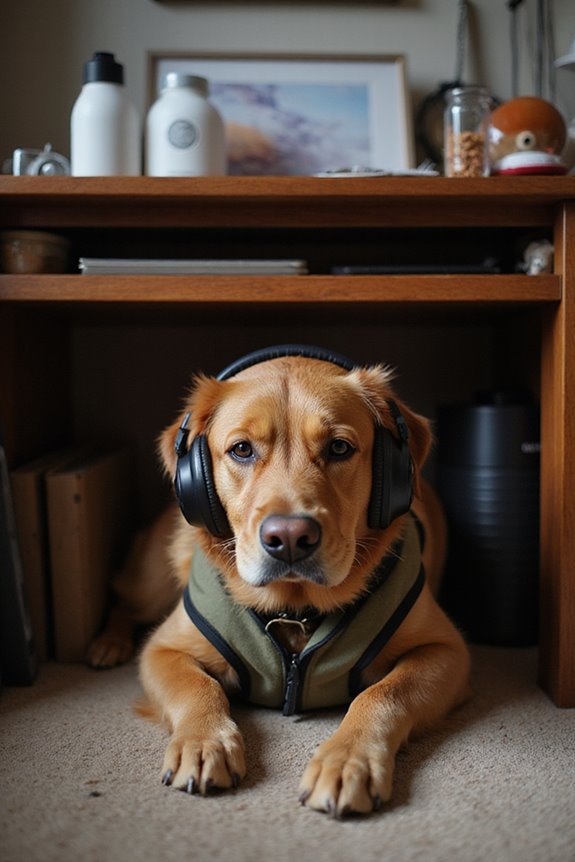
When faced with the challenge of a dog distressed by fireworks, it is crucial to implement effective behavioral interventions that can alleviate their anxiety. Two methods I recommend are desensitization training and counter-conditioning techniques.
Desensitization Training:
- Start with low-volume firework recordings during short sessions, pairing these with treats.
- Gradually increase the volume over weeks, monitoring your dog for stress signs.
Counter-Conditioning Techniques:
- Pair noise exposure with high-value treats, shifting their emotional response to positive.
- Provide praise when they remain calm during low-level exposure.
- Use distractions like chews or toys to redirect attention during fireworks.
Environmental Management Strategies
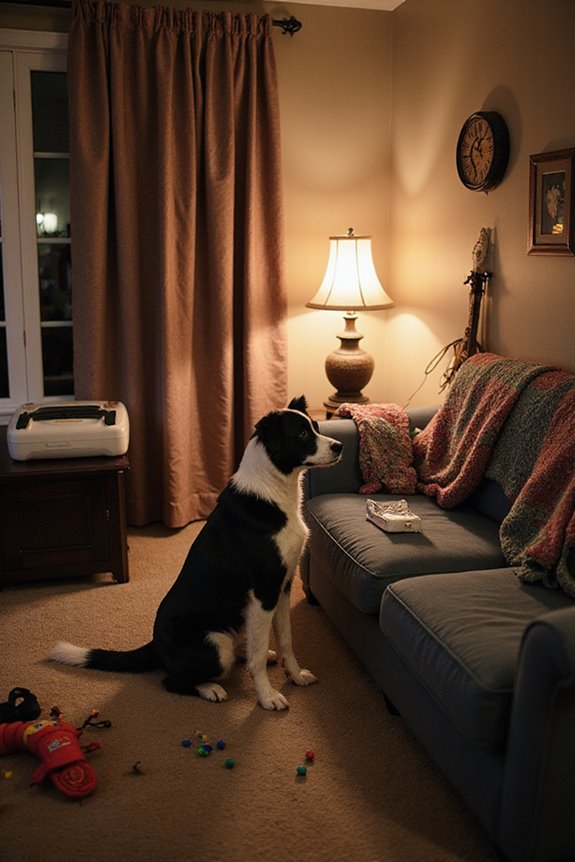
Implementing effective environmental management strategies can considerably reduce a dog’s anxiety during fireworks, complementing the behavioral interventions previously discussed. Here are key approaches to contemplate:
Safe Spaces
- Designate a quiet, enclosed area like a basement or a closet to minimize noise and visual exposure.
- Equip this space with your dog’s bed, favorite toys, and water, ensuring it feels comforting.
- Use blackout curtains to lessen the flashes from fireworks.
Noise Management
- Utilize white noise machines or fans to mask the sound of fireworks.
- Play calming music specifically designed for dogs to promote relaxation.
- Consistently maintain household noise to avoid sudden silence that emphasizes fireworks sounds.
Pharmacological and Alternative Treatments
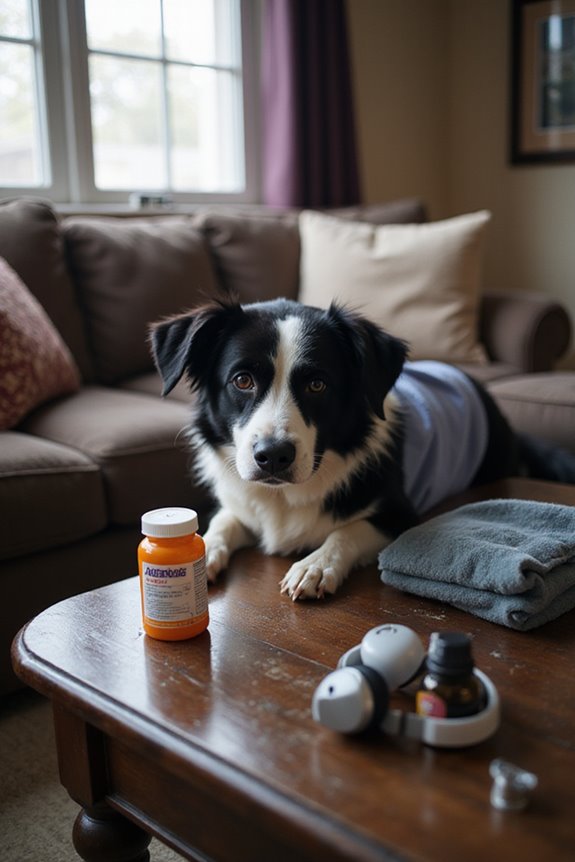
Managing a dog’s fear of fireworks often necessitates a multifaceted approach that includes both pharmacological and alternative treatments.
Pharmacological Treatments
1. Medication Types: Fast-acting options like alprazolam (Xanax®) help during acute anxiety episodes, requiring administration 30-60 minutes before exposure. For long-term relief, fluoxetine (Prozac®) serves as a daily medication to reduce overall anxiety.
Alternative Treatments
- Natural Supplements: Options such as melatonin can soothe some dogs, while veterinary supplements like Solliquin®, Anxitane®, and Zylkene® also support calm behavior.
- Anxiety Wraps & Pheromones: Products like Thundershirt™ and Adaptil® offer additional comfort through gentle pressure or calming scents.
Combining these approaches can create a thorough anxiety management strategy tailored to your dog’s needs.
Preventive Care and Socialization
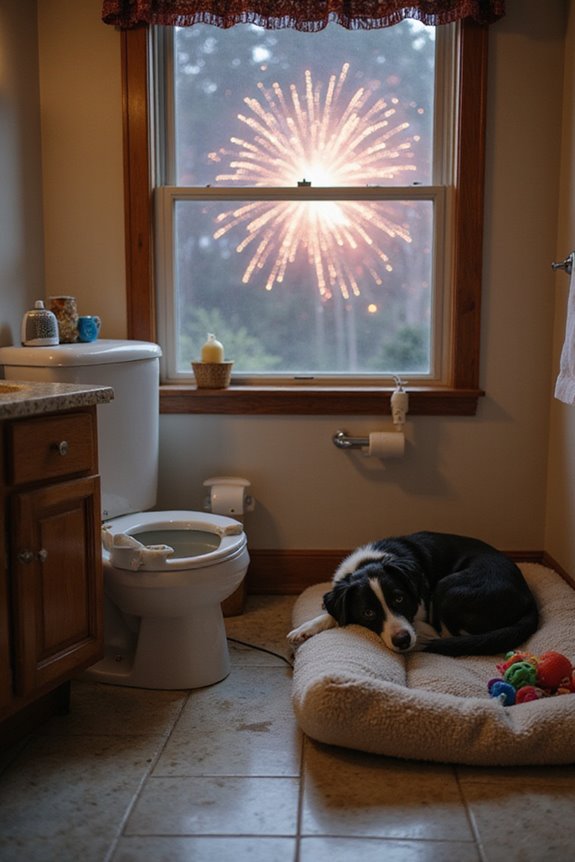
Addressing a dog’s fear of fireworks can benefit greatly from preventive care and effective socialization techniques. Implementing preventive training helps prevent anxiety from escalating. Start by gradually exposing your dog to firework sounds using low-volume recordings, pairing this with high-value treats, which fosters a sense of calm.
- Increase sound volume incrementally while monitoring for any signs of distress.
- Introduce social exposure by allowing your dog to experience various environments and everyday noises.
- Guarantee these interactions are controlled and positive, reinforcing brave behavior with treats and praise to enhance emotional resilience.
Establishing a consistent routine around these training sessions will also provide structure, helping your dog feel secure and prepared when fireworks occur.
Long-Term Management and Support
When it comes to successfully managing a dog’s fear of fireworks, developing a long-term support plan is essential. Here are some key strategies to take into account:
- Identify Anxiety Triggers: Recognize specific noises or events that elevate your dog’s anxiety.
- Establish Coping Mechanisms: Incorporate desensitization training with recorded firework sounds paired with high-value treats.
- Veterinary Consultation: Discuss behavioral medications if needed; implementing them before firework events can tremendously help.
- Create a Safe Space: Designate a comforting area for your dog during fireworks, complete with familiar items and soundproofing.
- Consistent Routine: Maintain predictable schedules, and train family members to respond calmly, ensuring everyone supports your dog’s journey toward reduced anxiety.
Engaging in these practices helps foster a sense of security for your dog.
Frequently Asked Questions
Can I Leave My Dog Alone During Fireworks?
I wouldn’t leave my dog alone during fireworks. It’s essential for firework safety and ensuring my dog’s comfort. Staying close offers them reassurance and support, helping to ease their anxiety when those loud noises begin.
How Can I Identify My Dog’s Specific Triggers?
I’ve watched my dog tremble and hide, her fearful behaviors revealing stress responses I couldn’t ignore. Figuring out her specific triggers became essential; identifying those moments of panic deepened our bond, and I learned to comfort her better.
What Are Signs of Severe Firework Anxiety?
I’ve seen my dog’s fireworks behavior turn anxious, with trembling and excessive panting. When those anxiety symptoms appear, like hiding or vocalizing distress, I know it’s time to comfort and reassure him through it all.
Are Some Dog Breeds More Susceptible to Firework Fear?
Absolutely, I’ve noticed that some breeds show more firework sensitivity due to their unique breed characteristics. It’s heartbreaking sometimes, realizing how anxiety can shape their experiences, especially during loud celebrations.
How Do I Know if Medication Is Necessary for My Dog?
When I evaluate my dog’s anxiety, I consider both medication alternatives and an anxiety assessment. If signs like trembling or destructive behavior persist, it might be time to explore professional guidance for effective solutions.

